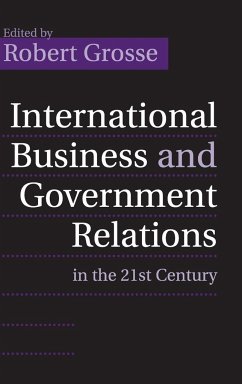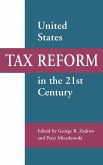Robert Grosse (ed.)
International Business and Government Relations in the 21st Century
Herausgeber: Grosse, Robert
Robert Grosse (ed.)
International Business and Government Relations in the 21st Century
Herausgeber: Grosse, Robert
- Gebundenes Buch
- Merkliste
- Auf die Merkliste
- Bewerten Bewerten
- Teilen
- Produkt teilen
- Produkterinnerung
- Produkterinnerung
This book offers an outlook on relations between national governments and multinational companies that provides broad coverage on the key issues likely to determine that relationship in the new century. From the perspective of the company decision maker concerned with national regulation and incentive policies, to the host government policy maker in an emerging market, to the home government policy-maker in a Triad country, each dimension is considered and analyzed in light of the others.
Andere Kunden interessierten sich auch für
![International Business and Government Relations in the 21st Century International Business and Government Relations in the 21st Century]() International Business and Government Relations in the 21st Century62,99 €
International Business and Government Relations in the 21st Century62,99 €![The World stage - navigating international relations in the 21st century The World stage - navigating international relations in the 21st century]() Lola JaxongirovaThe World stage - navigating international relations in the 21st century10,99 €
Lola JaxongirovaThe World stage - navigating international relations in the 21st century10,99 €![German-American Relations in the 21st Century German-American Relations in the 21st Century]() German-American Relations in the 21st Century54,99 €
German-American Relations in the 21st Century54,99 €![The Israeli Economy from the Foundation of the State through the 21st Century The Israeli Economy from the Foundation of the State through the 21st Century]() Paul RivlinThe Israeli Economy from the Foundation of the State through the 21st Century116,99 €
Paul RivlinThe Israeli Economy from the Foundation of the State through the 21st Century116,99 €![United States Tax Reform in the 21st Century United States Tax Reform in the 21st Century]() R. Zodrow / Peter Mieszkowski (eds.)United States Tax Reform in the 21st Century120,99 €
R. Zodrow / Peter Mieszkowski (eds.)United States Tax Reform in the 21st Century120,99 €![The Euro in the 21st Century The Euro in the 21st Century]() Maria Lorca-SusinoThe Euro in the 21st Century109,99 €
Maria Lorca-SusinoThe Euro in the 21st Century109,99 €![Government and Economic Growth in the 21st Century Government and Economic Growth in the 21st Century]() Government and Economic Growth in the 21st Century169,99 €
Government and Economic Growth in the 21st Century169,99 €-
-
-
This book offers an outlook on relations between national governments and multinational companies that provides broad coverage on the key issues likely to determine that relationship in the new century. From the perspective of the company decision maker concerned with national regulation and incentive policies, to the host government policy maker in an emerging market, to the home government policy-maker in a Triad country, each dimension is considered and analyzed in light of the others.
Produktdetails
- Produktdetails
- Verlag: Cambridge University Press
- Seitenzahl: 542
- Erscheinungstermin: 31. Oktober 2016
- Englisch
- Abmessung: 235mm x 157mm x 33mm
- Gewicht: 927g
- ISBN-13: 9780521850025
- ISBN-10: 0521850029
- Artikelnr.: 21247746
- Herstellerkennzeichnung
- Libri GmbH
- Europaallee 1
- 36244 Bad Hersfeld
- gpsr@libri.de
- Verlag: Cambridge University Press
- Seitenzahl: 542
- Erscheinungstermin: 31. Oktober 2016
- Englisch
- Abmessung: 235mm x 157mm x 33mm
- Gewicht: 927g
- ISBN-13: 9780521850025
- ISBN-10: 0521850029
- Artikelnr.: 21247746
- Herstellerkennzeichnung
- Libri GmbH
- Europaallee 1
- 36244 Bad Hersfeld
- gpsr@libri.de
Professor of International Business and Director of CIBER Thunderbird, The Garvin School of Management.
Introduction Robert Grosse; Part I. History and Theories of Analysis of
Government-Business Relations: 1. The relevance of the early literature on
business-government relations for the early 21st century Jean Boddewyn; 2.
Institutional reform, FDI, and European transition economies John Dunning;
3. Corporate governance in the global economy: national diversity or
international convergence? Lee Preston; 4. Revisiting rival states: is the
new diplomacy still triangular? John Stopford; Part II. The Shifting
Government-Business Partnership: 5. International business and government
relations in central and eastern Europe Klaus Meyer and Camilla Jensen; 6.
Global warming in the 21st century: new issues for business strategy,
government policy and research on business-government relations Thomas
Brewer; 7. Evolution of business-government relation in the culture
contents industry Dong-Song Cho; 8. Multinational enterprise as public
authority: the blurring of the line between state and market Steve Kobrin;
9. The role of direct private foreign investment in developing countries:
the judo trick Paul Streeten; Part III. Bargaining Theory and the
Obsolescing Bargain: 10. Revisiting the obsolescing bargain Lorraine Eden,
Stephanie Lenway, and Doug Schuler; 11. Bargaining theory in the 21st
century Robert Grosse; 12. Shifts in Chinese government policies on inbound
FDI Yadong Luo; 13. Has the obsolescing bargain obsolesced? Negotiating
with foreign investors Alvin G. Wint; Part IV. Host and Home Government
Points of View: 14. Global regulatory convergence: the case of intellectual
property rights Ravi Ramamurti; 15. Regional multinationals and government
policy: the end of multilateralism Alan Rugman; 16. How will third world
countries welcome foreign direct investment in the 21st century Stefan H.
Robock; 17. Assessing government policies for business competitiveness in
emerging market economies: an institutional approach Dennis Rondinelli; 18.
Protecting foreign investors in the developing world: a shift in U.S.
policy in the 1990s? Louis T. Wells; Conclusions; Bibliography
Government-Business Relations: 1. The relevance of the early literature on
business-government relations for the early 21st century Jean Boddewyn; 2.
Institutional reform, FDI, and European transition economies John Dunning;
3. Corporate governance in the global economy: national diversity or
international convergence? Lee Preston; 4. Revisiting rival states: is the
new diplomacy still triangular? John Stopford; Part II. The Shifting
Government-Business Partnership: 5. International business and government
relations in central and eastern Europe Klaus Meyer and Camilla Jensen; 6.
Global warming in the 21st century: new issues for business strategy,
government policy and research on business-government relations Thomas
Brewer; 7. Evolution of business-government relation in the culture
contents industry Dong-Song Cho; 8. Multinational enterprise as public
authority: the blurring of the line between state and market Steve Kobrin;
9. The role of direct private foreign investment in developing countries:
the judo trick Paul Streeten; Part III. Bargaining Theory and the
Obsolescing Bargain: 10. Revisiting the obsolescing bargain Lorraine Eden,
Stephanie Lenway, and Doug Schuler; 11. Bargaining theory in the 21st
century Robert Grosse; 12. Shifts in Chinese government policies on inbound
FDI Yadong Luo; 13. Has the obsolescing bargain obsolesced? Negotiating
with foreign investors Alvin G. Wint; Part IV. Host and Home Government
Points of View: 14. Global regulatory convergence: the case of intellectual
property rights Ravi Ramamurti; 15. Regional multinationals and government
policy: the end of multilateralism Alan Rugman; 16. How will third world
countries welcome foreign direct investment in the 21st century Stefan H.
Robock; 17. Assessing government policies for business competitiveness in
emerging market economies: an institutional approach Dennis Rondinelli; 18.
Protecting foreign investors in the developing world: a shift in U.S.
policy in the 1990s? Louis T. Wells; Conclusions; Bibliography
Introduction Robert Grosse; Part I. History and Theories of Analysis of
Government-Business Relations: 1. The relevance of the early literature on
business-government relations for the early 21st century Jean Boddewyn; 2.
Institutional reform, FDI, and European transition economies John Dunning;
3. Corporate governance in the global economy: national diversity or
international convergence? Lee Preston; 4. Revisiting rival states: is the
new diplomacy still triangular? John Stopford; Part II. The Shifting
Government-Business Partnership: 5. International business and government
relations in central and eastern Europe Klaus Meyer and Camilla Jensen; 6.
Global warming in the 21st century: new issues for business strategy,
government policy and research on business-government relations Thomas
Brewer; 7. Evolution of business-government relation in the culture
contents industry Dong-Song Cho; 8. Multinational enterprise as public
authority: the blurring of the line between state and market Steve Kobrin;
9. The role of direct private foreign investment in developing countries:
the judo trick Paul Streeten; Part III. Bargaining Theory and the
Obsolescing Bargain: 10. Revisiting the obsolescing bargain Lorraine Eden,
Stephanie Lenway, and Doug Schuler; 11. Bargaining theory in the 21st
century Robert Grosse; 12. Shifts in Chinese government policies on inbound
FDI Yadong Luo; 13. Has the obsolescing bargain obsolesced? Negotiating
with foreign investors Alvin G. Wint; Part IV. Host and Home Government
Points of View: 14. Global regulatory convergence: the case of intellectual
property rights Ravi Ramamurti; 15. Regional multinationals and government
policy: the end of multilateralism Alan Rugman; 16. How will third world
countries welcome foreign direct investment in the 21st century Stefan H.
Robock; 17. Assessing government policies for business competitiveness in
emerging market economies: an institutional approach Dennis Rondinelli; 18.
Protecting foreign investors in the developing world: a shift in U.S.
policy in the 1990s? Louis T. Wells; Conclusions; Bibliography
Government-Business Relations: 1. The relevance of the early literature on
business-government relations for the early 21st century Jean Boddewyn; 2.
Institutional reform, FDI, and European transition economies John Dunning;
3. Corporate governance in the global economy: national diversity or
international convergence? Lee Preston; 4. Revisiting rival states: is the
new diplomacy still triangular? John Stopford; Part II. The Shifting
Government-Business Partnership: 5. International business and government
relations in central and eastern Europe Klaus Meyer and Camilla Jensen; 6.
Global warming in the 21st century: new issues for business strategy,
government policy and research on business-government relations Thomas
Brewer; 7. Evolution of business-government relation in the culture
contents industry Dong-Song Cho; 8. Multinational enterprise as public
authority: the blurring of the line between state and market Steve Kobrin;
9. The role of direct private foreign investment in developing countries:
the judo trick Paul Streeten; Part III. Bargaining Theory and the
Obsolescing Bargain: 10. Revisiting the obsolescing bargain Lorraine Eden,
Stephanie Lenway, and Doug Schuler; 11. Bargaining theory in the 21st
century Robert Grosse; 12. Shifts in Chinese government policies on inbound
FDI Yadong Luo; 13. Has the obsolescing bargain obsolesced? Negotiating
with foreign investors Alvin G. Wint; Part IV. Host and Home Government
Points of View: 14. Global regulatory convergence: the case of intellectual
property rights Ravi Ramamurti; 15. Regional multinationals and government
policy: the end of multilateralism Alan Rugman; 16. How will third world
countries welcome foreign direct investment in the 21st century Stefan H.
Robock; 17. Assessing government policies for business competitiveness in
emerging market economies: an institutional approach Dennis Rondinelli; 18.
Protecting foreign investors in the developing world: a shift in U.S.
policy in the 1990s? Louis T. Wells; Conclusions; Bibliography









